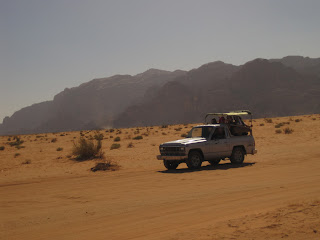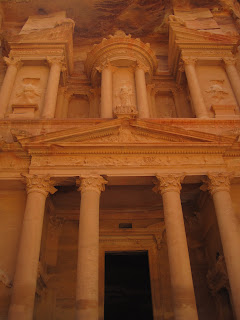It's elections season in the Hashemite Kingdom of Jordan. In fact, the elections for Parliament are only 3 days away. My Arabic isn't serviceable for intellectual conversations on the complexities of elections in a kingdom, but there are a few things I've been able to gather about the whole situation from my courses, conversations and from a field trip we took last week. Everything I've written here is a matter of subjective observation and personal thought, nothing more.
Campaigning for the elections started all of a sudden. One morning, I stepped out of my host family's house for my walk to school, and the streets were filled with banners and campaign posters. It turns out, it is illegal to campaign until one month prior to elections. Therefore, once campaigning begins, no one wastes a single minute. While in the states, we have months of humiliations and petty triumphs between candidates, in Jordan, campaigning is crammed into one intense month of posters, banners, campaign tents and social networking.
At the end of my street, they've erected a huge campaign tent. Every candidate has one, and they are the center of political outreach for a candidate. I am neither Jordanian, nor a man, so I've never been inside of one of these, but I've heard that the candidates are often there in the evening, and that people in the area can get a free meal of mansaf, the national Jordanian dish, here many a night during campaign times.
Earlier this week, we went on a field trip to the nearby town of Faheis with Malek Twal, the second in command of the Jordanian Ministry of Political Development. He showed us around the town, and arranged meetings for us with two cousins who are running against each other for representation in the Parliament. Here's a picture of Malek Twal explaining elections to us in the campaign tent of the first candidate:

This first candidate welcomed us into his tent, served us cold water and hot tea, and sat with us to answer all of our questions. He didn't speak much English, so his son (who was studying in the UK and had come home to help his father's campaign) acted as translator for us (although, I actually understood most of what he was saying!). With a hopeful and idealistic attitude that felt very familiar, he spoke at length about his concern for human rights in Jordan, and his duties to his constituents should he win. He specifically cited the importance of delivering human rights to prisoners, and made a point of talking about his personal involvement with the issue including many visits to former prisoners to discuss their experiences including food, hygiene and their treatment. He also expressed strongly the need for freedom of expression in Jordan. This man seemed to have a genuine interest in the rights of the people, saying that once in office, his door would always be open to his constituents to come discuss their concerns. While this could easily be an empty promise, Jordan is a very small country, and voting districts are tiny compared to the size of what we're used to in the states, so it is possible although probably quite time consuming to retain a personal connection between Parliament member and constituency.
This man reminded me of the hopeful liberals who always run for city council or state legislature at home. He has big ideas, and is earnest in his campaigning, but he probably doesn't stand a chance against the wheeling and dealing of the "big boys."
The second candidate we visited was the total opposite. We met him down the road a bit at his campaign headquarters instead of in his campaign tent. He ushered us into his office, and then left us in there with Dr. Malek, while he answered phone calls and the questions of his staffers. Once he finally came in and sat with us (he's on the left in the picture below), we didn't have time for many questions.

What I did gather from this visit was the total opposite of our last visit. The main issue of this man's campaign was essentially "to make a more fair Parliament." At first I thought, huh, that's an interesting and specific goal, maybe that's good. But, then I realized it's not much of a campaign goal at all. And then I looked at the offices around me which, in the words of one of my fellow students looked suspiciously like "mafia boss" offices. I'm not saying they were, I probably wouldn't have the slightest idea if I stumbled into the middle of something like that. More to the point, it looked like a lot of money comes in and out of that office, and I got the sense that the candidate didn't really need to work very hard to prove himself to anyone.
I don't know enough to make a real statement about it, but perhaps this man was one of the "big boys" I referenced earlier, who will use all his power to squish the idealistic candidate and his real concerns about the people. It seems likely. The downtown of Fuheis was plastered with his posters:
Next, we drove back through Amman, making a quick stop at a candidate's house. I'm not really sure why we stopped there since we didn't go in, but it certainly left an impression. This house is enormous. I know that this does not represent all candidates, but it certainly says something:

Even though I guess it's possible to run without a personal fortune, I'm not sure there are really any political candidates in the world that can run purely on values and a good message. During our trip, I heard that a person could spend at least $100,000 on a campaign, and that $5 million was a high but not unreasonable number. It certainly says something about a potentially scary pitfall of representative democracy. Of course, in theory, the best ideas should win, but in reality, sometimes money can buy you a lot of clever, flashy advertising or a lot of votes. Speaking of which, I learned that the going rate for a person's vote is about 500 Jordanian Dinar, and that the government is fighting really hard to keep people from buying votes. Mostly this involves tracking registrations. For example, if you're registered to vote in Aqaba, and you and a busload of Aqaba people show up to vote in Irbid, it's a pretty strong indication of something fishy happening. Certainly, it's not always so obvious, but regulating elections is a part of having free and fair elections.
Jordan certainly faces some serious challenges in its push for democratization. Structurally speaking, a kingdom with a democratically elected legislative body has to be able to demonstrate that the elected officials have real power. At base, if an elected body is just a gesture of appeasement to those who demand democracy, then democracy cannot flourish. However, I believe that is not the case here. Rather, it seems that Jordan's powerful executive branch has a sincere interest in taking steps to make the Parliament a vestige of true democracy in the region. After the dissolution of the last Parliament, these elections are crucial in determining whether Jordanians can trust this aspect of their system. It seems that if this session goes as poorly as the last, it will be very challenging to prove the legitimacy of this body.
Socially speaking, the elections face enormous obstacles. Campaigning here is based largely on an intricate, and ancient system of social relations. Families are the units that make up larger extended families, which make up tribes, and beyond that, there are tribes within larger tribes (we don't have the vocabulary for all of this in English, but I assure you, in Arabic, there are words for each of these groups as well as the relationships between the people in them). I won't go into the details of this system, but let me just emphasize that it is deeply, deeply ingrained and determine a lot of social relations. So, in terms of elections, campaigning is controlled by the power structures within families, extended families, tribes, and bigger tribes, as well as all the relationships between families, extended families, tribes and bigger tribes. Many, but of course not all, votes are cast more with this system in mind than the issues a candidate might represent. In fact, many candidates don't run on a platform at all, and almost nobody runs as a member of a party. So campaign slogans are almost always general, hopeful, and promise something no one can disagree with. Without discussion of issues, political negotiation, or open debate between candidates, voting really comes down to the social connections of the candidates.
One might even go so far as to say that there isn't enough politicking in the politics here.



















































